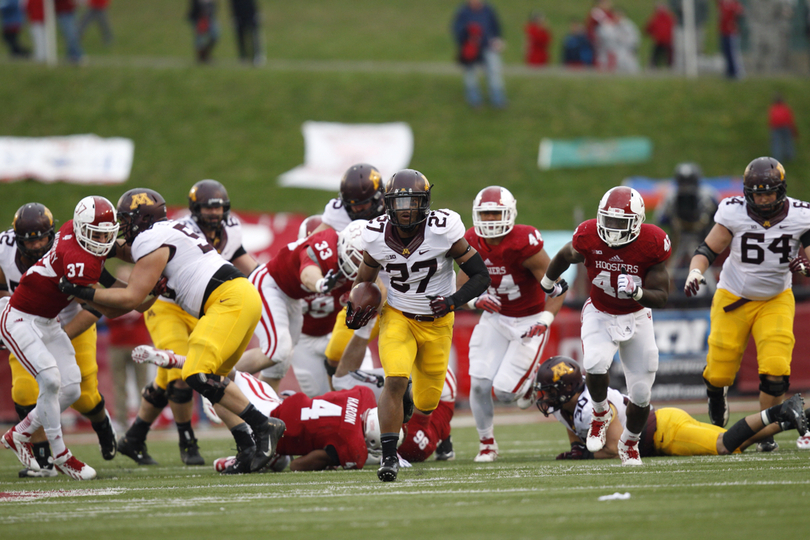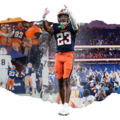Cowboy up: Texas native Cobb goes from sideline to starting role as 1,000-yard rusher leads Gophers into Texas Bowl

The last time Minnesota played in the Texas Bowl, running back David Cobb didn't see the field. This time things promise to be different. Courtesy of Minnesota Athletic Communications
David Cobb almost felt ashamed.
Looking up in the stands he saw his entire family watching a game that he knew he had no chance of entering.
Minnesota was facing Texas Tech in the 2012 Texas Bowl, and Cobb, a Texas native and sophomore running back for Minnesota, had rushed for only eight yards all season. And like nearly every game that season, all he would do that day was look on from the sidelines.
His attendance was a mere formality.
“I wouldn’t say embarrassed, but that’s kind of what you are,” Cobb said. “You go back home, so many friends and family waiting for you to play. And you don’t play. And it’s just one of those things where you practice every day, and you’re trying to work hard, but you don’t really have any answers at the end of the day.”
In Cobb’s first two seasons at Minnesota, he couldn’t find an answer. He felt unnoticed, as if the coaches had forgotten he was even on the team. But when last season’s leading rusher, Donnell Kirkwood, sat two games with an injury earlier this season, Cobb made the most of the opportunity. He rushed for 1,111 yards, good for 17th best in program history, and best since 2006.
In one season he went from just another roster spot, to the team leader in touchdowns and all-purpose yards on the Golden Gophers, who are having their best season since 2003.
On Friday, Minnesota (8-4, 4-4 Big Ten) is in the Texas Bowl again, facing Syracuse (6-6, 4-4 Atlantic Coast) at 6 p.m. at Reliant Stadium in Houston. But this time, with the same faces watching him, he won’t be watching from the bench.
“He’s worked very hard, and it’s a great lesson for our young players that sometimes you just don’t get everything in life right now,” Minnesota head coach Jerry Kill said. “You have to earn it and work for it, and he’s done that and certainly he’s helped us get to where we’re at.”
Cobb’s time has finally come, but it’s two years later than he expected. He thought he’d be the main guy right out of Ellison High School in Killeen, Texas, where he starred as the primary running back for three seasons.
There, he was the lone Division I athlete in a program that didn’t deliver many to the top college ranks. He played through pain, one time refusing to leave a game after nearly cutting his lip completely open.
He thought his fight and prowess would lead to a seamless transition at Minnesota, but that wasn’t the case.
“Coming from high school, everybody’s like that,” Cobb said. “But I think when you get there, you just open up your eyes, because this is not high school, and everybody can play. That was the thing that I had to see, and I had to know that it’s not just going to be given, you have to work for it.”
During Cobb’s freshman season, he couldn’t hold onto the ball and was hindered by his fumbling problem. The coaches told him if he couldn’t fix the issue, he wouldn’t play. And when he didn’t, he sat for nearly two years.
But things started to change for Cobb during spring practice following the 2012 season. He had been playing better, and the coaches were beginning to take notice. The team came into the season with three primary backs, Cobb one of them.
All of them had a chance to play. But running backs coach Brian Anderson said he knew that splitting time wouldn’t work.
“We kind of reevaluated everything, and put it back on those guys and said, ‘Hey, someone’s got to take this job,’” Anderson said. “And when (Cobb’s) opportunity came, he seized it, and didn’t look back.”
Anderson said that even though Cobb appeared to be an afterthought for his first two seasons, no one had forgotten about him.
Kirkwood, who Cobb replaced this season, would spend his time between drives last season with Cobb, explaining what he was doing and seeing. He would be the guy that told Cobb to keep his head up when he wasn’t playing.
Anderson played a similar role, making Cobb push himself even when the results seemed intangible.
“When you see that kind of talent, you don’t give up on a kid,” Anderson said. “You just keep pushing him, and keep pushing him, and keep pushing him. And not the yell-and-screaming kind of way, but just talk to him individually.”
So even though Cobb may have felt forgotten and couldn’t play in front of his friends and family in the last Texas Bowl, now he’s an integral part of Minnesota’s attack.
Cobb is excited to take the field and do what he couldn’t last time around, and said that though difficult, it’s all been worth it.
“It’s everything you dream of,” Cobb said. “You feel like coaches have forgotten about you. But then, you come out and have a year like this, and life just floats.
“It means so much to go back in front of my family and hometown friends and coaches … I just want to play for them.”




